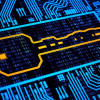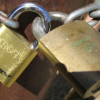Quantum crypto moves out of the lab
Quantum cryptography - long the stuff of cyberpunk novels and hi-tech spy stories - is leaving the laboratory and making its way into commercial markets. A briefing session at the UK's Department of Trade and Industry on Wednesday featured demonstrations of working quantum key exchange systems by QinetiQ, Toshiba Cambridge and US start-up MagiQ.
Quantum cryptography allows two users on an optical fibre network to exchange secret keys. It takes advantage of the particle-like nature of light. In quantum cryptography, each bit of the key is encoded upon a single light particle (or ?photon'). Intercepting this data randomly changes the polarisation of the light, irreversibly altering the data. Because of this quantum mechanics effect any attempt by an eavesdropper to determine a key corrupts the same key. Quantum cryptography systems discard these corrupt keys and only use codes that are known to be secure. These quantum keys, once exchanged, can be used in a one-time pad.
Advances in quantum computers or the discovery of advanced mathematical algorithms might one day threaten conventional scrambling techniques but quantum cryptography, properly implemented, is immune from such attacks.









































































